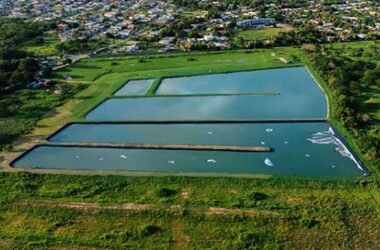
With the realities of climate change ‘hitting home’ forcefully and affecting the average citizen in different ways, the recent sudden and unexpected deluge in the northern region this month has been brought into focus.
Chairman of the Development Control Authority (DCA) Ignatius Jean, spoke out on the Government Information Service (GIS) channel – Issues and Answers programme and expounded on the scope of sustainable development in this climate change era.
The DCA functions as an agency of the government and is a statutory body that consists of a Board of Directors. The panel also includes representatives from various technical agencies such as the engineering society, architects, and other representatives from civil society, while the Public Utilities has observer status on the board.
The DCA board is recognised as a “multi-disciplinary team” and its mandate is to have oversight over all development in Saint Lucia on land or maritime spaces.
“We are a regulatory body to ensure the safety of the public… and we partner and collaborate with various other state agencies to ensure that we undertake proper development,” said DCA chairman Jean.
In making plans to tackle and rectify the situation, Jean noted, it was important to reflect on records of past ‘weather hazardous’ events in charting the way forward.
In retrospect, he said, with the DCA having to face such regulatory challenges it was important to undertake an “environmental impact assessment” of the location chosen for development.
Jean said with the DCA looking to ensure that all regulatory procedures are in place, people sometimes tend to look upon the agency as a “stumbling block” in the way of development.
However, he explained, “what we are trying to do at the DCA is to ensure that when we’re building …is to build properly, so you would minimize the risk of losing what you already have to get back into the expense of building back better.”
The DCA chairman said the safety of individuals and their families is a priority, and so persons need to have the proper structural designs “certified by engineers and architects that this will be safe and how are you going to manage on the slopes… drainage systems, and whether you would need retaining walls.”
Jean said, in the event that an individual was purchasing property from a sub-division “there are people who have land and maybe it is the fastest way or the best return on your investment if you have land that you can sub-divide it and get a good return on your investment.”
He said, however, “Too many people in the society have been left in difficult circumstances, having purchased properties in the past where there was no infrastructure put in.”
Jean noted that over the years, the DCA has sought to ensure that any developer with large type developments “would put in a ‘performance bond’ to be sure that we will enforce that you put in appropriate and proper infrastructure, or otherwise have an Escrow account with the DCA, so we have oversight of that infrastructure in place. So, the public who purchase these properties would be able to have access …all weather roads are stable and there is proper drainage along the roads.”
He explained that there will be run-offs from developments, and with properties located on slopes the water from roofs and concrete pavements spill over into adjoining property.
Jean said lots of the damages suffered over the weekend was due to unplanned development. He added that though some of the developments were planned, yet “people do not care about their neighbours and we all must live in that space, because it is going to impact everyone.”
To address this issue, he said, there has to be “a holistic concept of development in the country that we continue to strive to have the zonal type approach and determine which are suitable and those that are unsuitable for certain type of practices.”
The implementation of appropriate development policies have laboured over the years and the DCA is looking to address the matter.
Cognizant of the issues at stake, Jean disclosed that the DCA has been convening meetings and consultations with key stakeholders “to look at specific policy and how we can be able to pursue the holistic development agenda of the country and the aspects of our own regulations that need to be updated.”
He said, it’s a work in progress and the DCA’s technical teams are now working with the attorney general “so that some of these could be properly brought to the appropriate places, like the cabinet …and eventually the parliament for having the proper legislation as well as amendments and the statutory instruments to put in place the regulations.”
In addition, Jean said, there are building codes that have been sitting around for a long time but have never formed part of the regulatory system and so, it is essential “to formalize it through the legal process.”







![Amy Stephen [Photo credit: Community Tourism Agency]](https://thevoiceslu.com/wp-content/uploads/2026/01/Amy-Stephen-feat-380x250.jpg)





